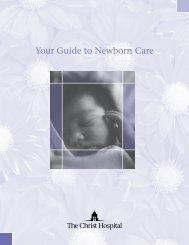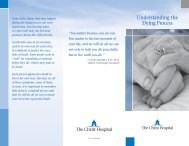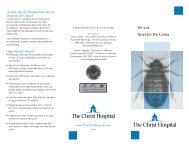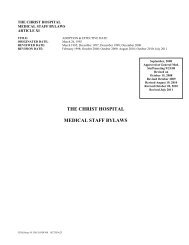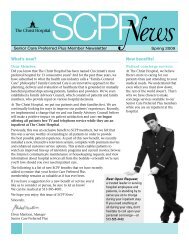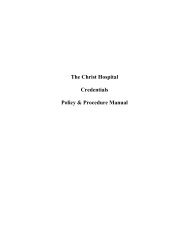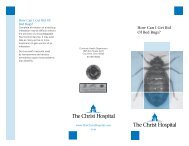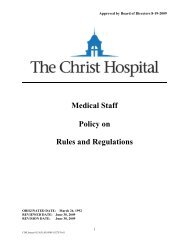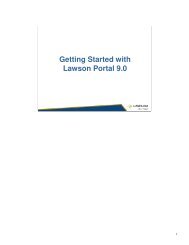Laura San Giacomo - The Christ Hospital
Laura San Giacomo - The Christ Hospital
Laura San Giacomo - The Christ Hospital
- No tags were found...
Create successful ePaper yourself
Turn your PDF publications into a flip-book with our unique Google optimized e-Paper software.
OvariancancercluesDon’t ignore these symptomsIt was almost 20 years ago that beloved comedienneGilda Radner died of ovarian cancer. Ifshe had known that the disease, as well as breastcancer, was part of her family health history, shemight have noticed the cancer’s subtle symptoms intime to treat it effectively.Fortunately for the approximately 21,650 womenwho developed ovarian cancer last year, the prognosisisn’t always that grim. Women diagnosed when thecancer is contained within the ovary face a five-yearsurvival rate of almost 93 percent.As with all cancers, the key to combatingovarian cancer is early detection. However, patientsusually aren’t aware of the symptoms until the canceris in its mid to late stages. Annual pelvic exams canhelp detect ovarian cancer, but if you’re at risk, payspecial attention to any abnormal discomfort. Thatwas crucial for Louise Trapp of Cincinnati. Nowfree of ovarian cancer for more than three years, shepursued an initial diagnosis after she began havingstomach pain that gradually increased. “I thought itmight’ve just been bloating from a meal, but whenthe discomfort didn’t disappear, I knew I had to seea physician,” says Trapp.Watch for the signsBecause there’s ample room in the abdominalcavity surrounding the ovaries, ovarian tumors oftenaren’t detected until they’ve grown large enough tocause one or more of these persistent problems:• indigestion, gas or bloating that can’t beotherwise explainedYour ovariancancer riskAccording to the American Cancer Society, yourrisk for ovarian cancer increases if you are overage 50, are obese, have never given birth orhave a personal or family history of breast orcolon cancer. Your risk rises if you have a closeblood relative (mother, sister, daughter) who hadovarian cancer. Two or more close blood relativeswith the disease increase your risk even more,as does a family history of cancer caused by amutation of the breast cancer gene BRCA1 orBRCA2. Some studies suggest that lengthy useof menopausal hormone therapy with estrogenalone and long-term use of talcum powder in thegenital area may also raise your risk.16Women’s Health Today



